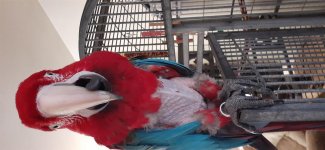ChristeyHawk
New member
Hello, I've just found and joined the website. As the title would imply, I've recently welcomed a macaw to the family.
Toby is a green winged Macaw, approx 20 years old and a former Busch Gardens show bird. At some point he began plucking feathers and then covid happened and he was "retired".
When I brought him home he was such a love! I could hold him, pet him, and we interacted very well.
That lasted about 3-4 days. Then he decided he didnt want to step up. As days have gone by he has begun lunging when I walk past his cage. He still loves to sing and dance with me, he will talk, and perform most behaviors when I ask. Coming to me is no longer a thing. Although, he has developed a bond with my adult daughter. He absolutely adores her. He even climbed off his cage and marched into the living room to be next to her.
I've been reading as much as I can and have some thoughts but overall I'm wondering if he just chose who he wants to bond with and that's that?
Any thoughts or ideas to help me bond with my bird?
Thanks!
Toby is a green winged Macaw, approx 20 years old and a former Busch Gardens show bird. At some point he began plucking feathers and then covid happened and he was "retired".
When I brought him home he was such a love! I could hold him, pet him, and we interacted very well.
That lasted about 3-4 days. Then he decided he didnt want to step up. As days have gone by he has begun lunging when I walk past his cage. He still loves to sing and dance with me, he will talk, and perform most behaviors when I ask. Coming to me is no longer a thing. Although, he has developed a bond with my adult daughter. He absolutely adores her. He even climbed off his cage and marched into the living room to be next to her.
I've been reading as much as I can and have some thoughts but overall I'm wondering if he just chose who he wants to bond with and that's that?
Any thoughts or ideas to help me bond with my bird?
Thanks!

